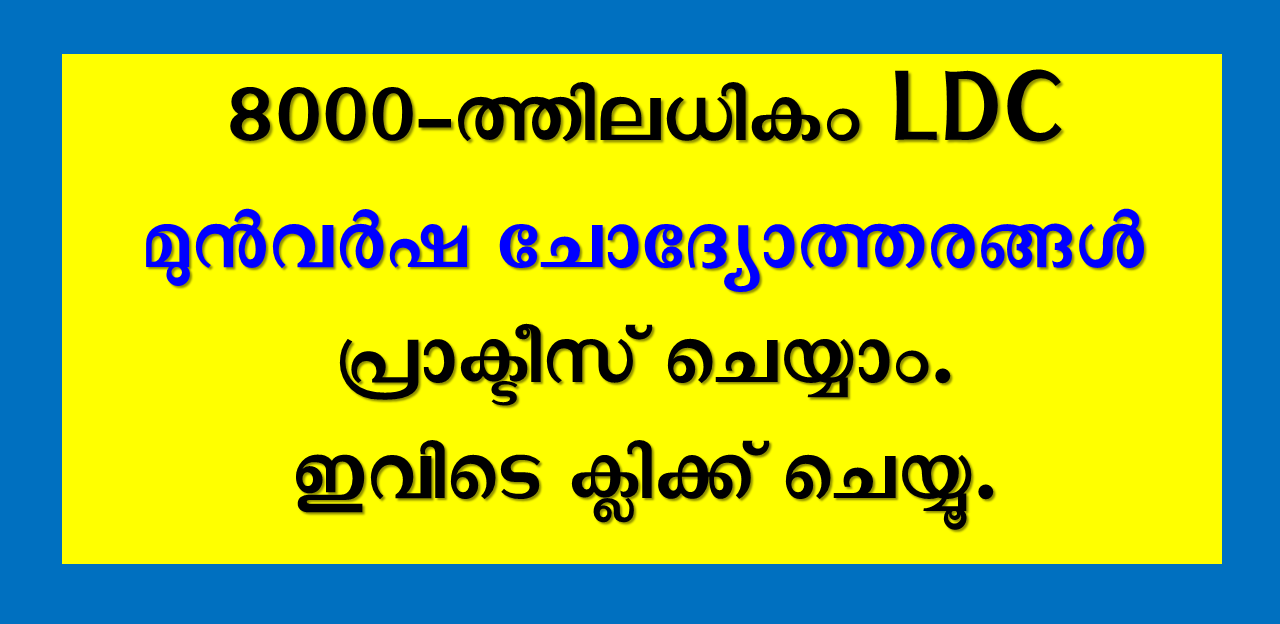PSC Lecturer in Computer Science Model Questions and Answers
PSC Lecturer in Computer Science Model Questions and Answers: Here are the model questions and answers for Lecturer in Computer Science PSC examination. These are the previous asked questions for the PSC Lecturer in Computer Science Examination.
PSC Lecturer in Computer Science Model Questions and Answers
1. Who called Ayyan Kali the Pulaya king in 1936?
(A) A K Gopalan (B) Dr. Palpu
(C) Mahathma Gandhi (D) V T Bhattathirippadu
Answer: C
2. The famous Sanskrit work Darsanamala was composed by ?
(A) Sree Narayana Guru (B) Vaikunda Swamikal
(C) Chattampi Swamikal (D) Sankaracharya
Answer: A
3. Malabar Special Police (MSP) was organised by the British in ?
(A) 1921 B) 1854
(C) 1860 (D) 1880
Answer: Question Cancelled
4. Which amoung the following stories of Vaikom Muhammed Basheer is reflected in the Malayalam movie Bhargavi Nilayam ?
(A) Anargha Nimisham (B) Balyakalasakhi
(C) Janmadinam (D) Neela Velicham
Answer: D
5. The Augustan Age of Kerala music is the reign of ?
(A) Sri Chitra Tirunal (B) Utram Tirunal
(C) Swati Tirunal (D) Visakham Tirunal
Answer: C
6. Which country suggested the name Hudhud for the severe cyclonic storm -2014
(A) Bahrain (B) Iran
(C) Saudi Arabia (D) Oman
Answer: D
7. The First Radio Station in Kerala ?
(A) Cochin (B) Thiruvananthapuram
(C) Alappuzha (D) Thrissur
Answer: B
8. 2014- Nobel Prize winner in Economics ?
(A) Jean Tirole (B) Eugene F .Fama
(C) Shuji Nakamura (D) Patrick Modiano
Answer: A
9. Ringworm is a common infection caused by ?
(A) A Worm (B) Fungus
(C) Bacteria (D) Virus
Answer: B
10. The Election Commission of India is set up by which articile of Indian Constitution ?
(A) Article 310 (B) Article 316
(C) Article 324 (D) Article 256
Answer: C
11. The approach which is grounded in the theoretical belief that there is an objective reality that can be known to the researcher if she/he uses the correct methods and applies those methods in a correct manner.
(A) Dialectics (B) Positivism
(C) Interpretivism (D) Pragmatism
Answer: B
12. One of the prime aims of scientific method in research is to
(A) eliminate spurious relations (B) improve data interpretation
(C) confirm triangulation (D) inroduce new variables
Answer: A
13. Developing a hypothesis based on an existing theory and designing a research strategy to test the hypothesis is
(A) pragmatic approach (B) inductive approach
(C) deductive approach (D) emancipatory approach
Answer: C
14. Knowingly representing the work of others as your own in the manuscript submitted to a journal or publication is
(A) citation (B) documentation
(C) epigraph (D) plagiarism
Answer: D
15. The idea of ‘micro-teaching’ was first originated in
(A) Oxford University (B) Stanford University
(C) Delhi University (D) Christ University
Answer: B
16. The type of learning which leads to deep learning is
(A) reflective learning (B) memory level learning
(C) mnemonic technique (D) conceptual understanding
Answer: A
17. A teacher attempts to shape, control and evaluate the behaviour and attitude of students in accordance with a set standard of conduct. The approach of the teacher is
(A) permissive (B) constructivist
(C) authoritarian (D) accommodative
Answer: C
18. After learning certain topics from a particular subject, the student put the ideas together to form a new content. The cognitive process involved is
(A) evaluation (B) synthesis
(C) analysis (D) application
Answer: B
19. Effective teaching happens when the teacher
(A) maintains discipline in the class
(B) possesses advanced scholarship in the subject
(C) has skill in teaching and managing the classroom
(D) makes the students actively engage in learning
Answer: D
20. Which among the following is a non-parametric test
(A) ‘t’-test (B) analysis of variance
(C) chi-square test (D) all of the above
Answer: C
21. The power to form a new state is vested in
(A) President of India (B) Union Cabinet
(C) Parliament (D) Supreme Court
Answer: C
22. Part III of the Constitution deals with
(A) Union and Territories (B) Citizenship
(C) Directive Principles of State Policy. (D) Fundamental Rights
Answer: D
23. Writ Petitions are filed before the Supreme Court for the enforcement of
(A) Fundamental Rights (B) Fundamental Duties
(C) Directive Principles (D) To declare emergency
Answer: A
24. List II in the VII Schedule of the Constitution is
(A) Union List (B) Concurrent List
(C) State List (D) None of the above
Answer: C
25. Duration of Rajya Sabha is
(A) Five Years (B) Six years
(C) Two years (D) Permanent
Answer: D




